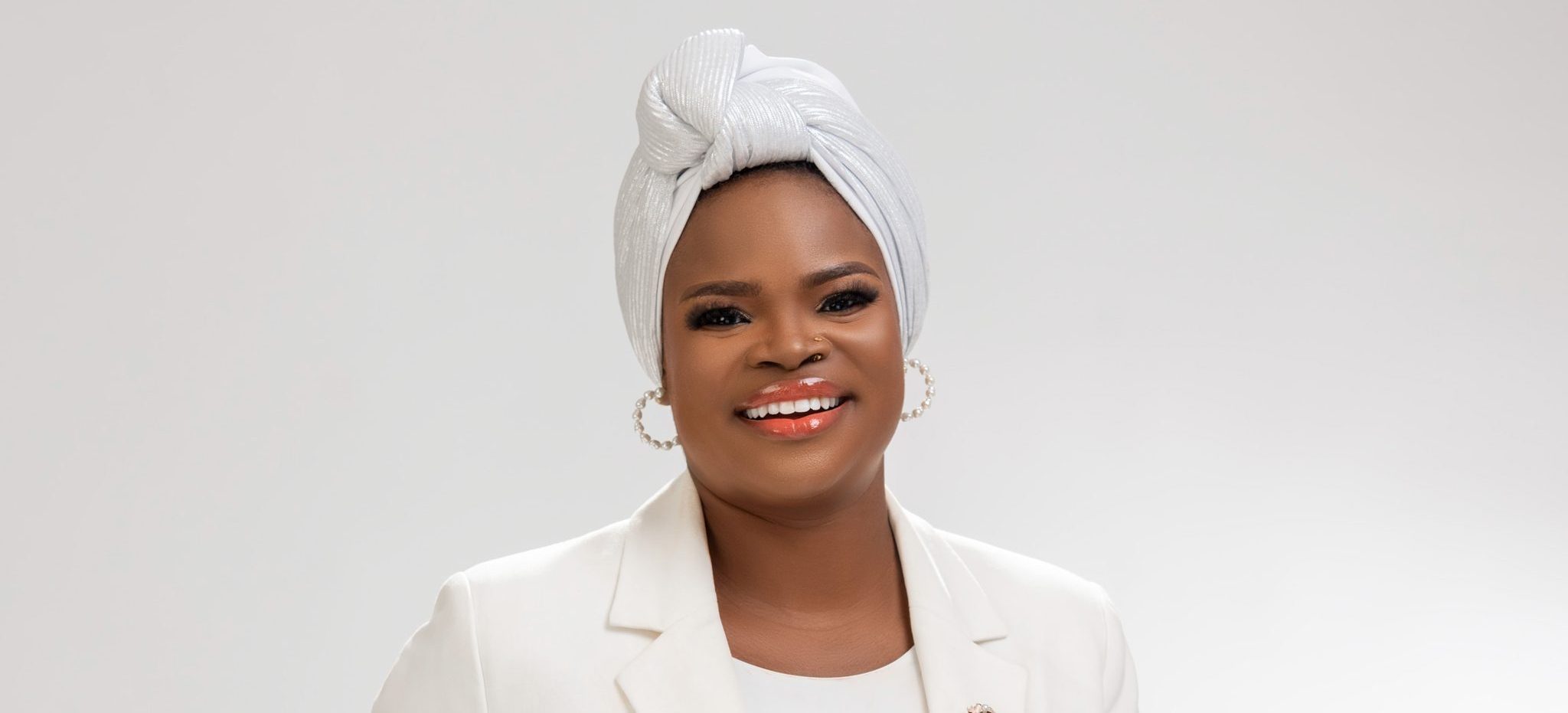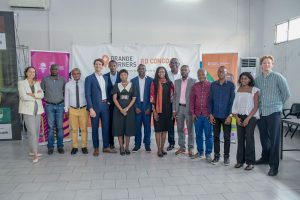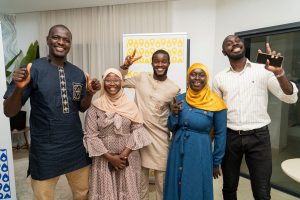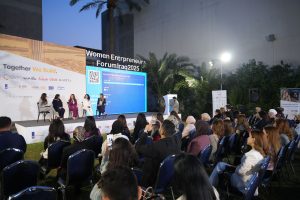Many care products currently on the market in African countries are of Western origin, created by Western experts, based on Western bodies. Using local knowledge and ingredients, Orange Corners entrepreneurs like Maryam Adebola-Salami have set out to change this. Driven by the desire to solve common health problems experienced by babies in Nigeria (including her own!), Maryam has developed her own body and hygiene solutions brand: Mobaby Care Nigeria. Our travelling reporter spoke to her at the West Africa Deal Summit, where Maryam was part of the mixed Ghanaian-Nigerian delegation of promising Orange Corners entrepreneurs pitching to high-level investors in the DealRooms.
Hi Maryam, lovely to meet you! Could you quickly introduce yourself and Mobaby?
My name is Maryam Adebola-Salami. I’m the founder and business development strategist for Mobaby Care Nigeria, where we use clinically approved ways to manufacture safe and effective body and hygiene solutions for African children under 10.
What inspired you to start Mobaby?
When my daughter was born, I was unlucky to get a synthetic oil, which left her skin grafting and burning. This went on for about 6 months, as I couldn’t get an appointment with a dermatologist. The GP just kept giving us something to help her sleep. I felt really angry: she’s a baby, why would anyone want to make synthetic baby products? I didn’t realise how common that was. I researched natural solutions and found shea butter and coconut oil. With my background as a scientist, I thought about how to refine it, improve it and make it more baby-friendly and easier to use. But when my second child also reacted to shea butter, it occurred to me that some people still react to the most natural things you can find on earth. So we went on to create a product line for sensitive or allergic babies, increasing our products from just 2 to 24 today.
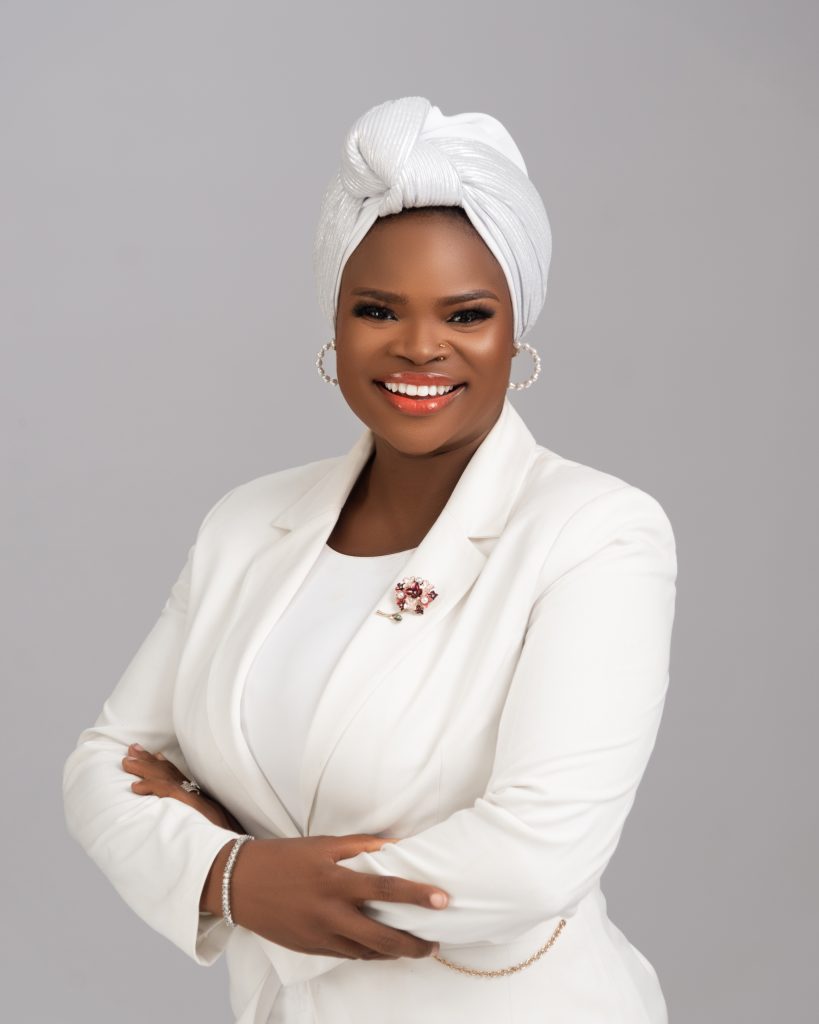
Your products are created for an African public. Why is this important?
The African skin is different than the Caucasian skin, that’s a natural reality. And a lot of the products currently available in the market are of Western origin, so their experiences are with Western skin. They don’t usually have African experts on their teams, while the truth is: making products for African skins is quite tough. The processes are longer, the profit margin is not as high, because with the sun we have here you have to keep ingredients in almost the natural state for it to penetrate into our skin.
We’re not here to take a chunk of the market from the existing brands or make cosmetics for children to beautify them, our products solve health problems children might have. The body butter isn’t just body butter, it also offers protection from UV rays. Our products aren’t just repellents, they help combat malaria. And we also have a calming oil, soap and lotion, which helps babies suffering from colic or constipation. And also sickle cell patients. My daughter is a sickle cell carrier and I’ve met a lot of other patients. Many eventually die from liver or kidney failure because of medications. Those medications are needed, but have adverse effects. Our oil and herb-based products help them restore calmness when they have a pain crisis, without needing more medications.
We still have a lot of work to do in terms of advocacy and education though. Our brand currently has over 100,000 beneficiaries, but maybe just 20,000 users. That’s to tell you the percentage of those who can’t afford the products or even understand the need for them. A lot of people even reach out to us to get products to make their children lighter. It’s absurd to use a bleaching product for children! One of the most common problems with African skins is eczema and rashes, and sometimes it doesn’t even come from hygiene products, clothing, detergents or diapers, but from the overuse of steroids to lighten and soften their skin. Africans should love their love their skin and be proud of it.
Africans should love their love their skin and be proud of it
Maryam Adebola-Salami
Your products are 100% made in Nigeria. Why the emphasis on this?
Nigeria imports a lot, which affects our GDP and causes inflation and an expensive currency. In the beginning, I wanted to import some things, because there are things that Nigeria is just not so good at, such as producing eco-friendly packaging. But this is expensive. So I thought “a lot of companies probably don’t even know a brand like mine exists, there must also be somebody who’s doing packaging”. So I put out a call on social media, and I got so many recommendations. And I felt like “oh my god, I’ve been spending money for something that’s right behind my back!” And I’m telling you, this company is 50 kilometres away, that’s nothing. I could literally walk down there and pick up my package.
And all our raw materials, every single thing is available in Nigeria. It just needs to be exploited at the cost in the right place. And the knowledge is there. In the beginning, when my daughter’s skin had grafted, it was my grandmother’s recipe that helped. We only made sure to test it scientifically, to ensure that we used the right formulations and under the right clinical analysis.
You’re an entrepreneur with a social mission. You aim to contribute to closing the gender gap, for example. Can you tell us more about that?
I’m the product of a single mother. My father left when I was one year away from finishing high school. I didn’t think I could finish high school anymore because it wouldn’t be possible for my mom to put three children through school. But my mother said she would work as much as she needed to, to ensure that we went to school. And I went to one of the best universities in Nigeria, studied what I wanted to study. There are many children with similar stories, but I turned out better because I had a mother who was willing to do more. A mother who was given the opportunity to do more. So I know the importance of opportunities for women. And it’s not just an SDG goal for me, it’s a personal story.
It’s part of everything we do. We ensure that our suppliers are 60% female-led, our partners at least 50% female-led and our staff at least 80% female-led. Not just because of the story or the SDG goals, but because we’re in an empathetic industry, we deal with children. It’s almost a natural thing for women to be empathetic when dealing with children. From procurements and production to logistics, sales, customer experience and post sales experience: there’s a mix of women in that, to appeal to the empathetic side of our customers.
Health and closing the gender gap are interrelated for us and the SDGs run through everything we do, whether we’re educating and supplying solutions for sickle cell patients, preventing malaria or educating and advocating for menstrual hygiene. The future of women in society depends on the gender balance. We provide jobs for women to ensure that they’re self-sustained and they can feed their families. We contribute to good health and well-being, to ensure women are in optimal health to even do that job. And education, so they understand the jobs available in the market. And we encourage responsible consumption.
Closing the gender gap is not just an SDG goal for me, it’s a personal story
Maryam Adebola-Salami
You’re part of the Orange Corners delegation to the West Africa Deal Summit because we think you’re an entrepreneur with great potential. What are your hopes for the summit?
Orange Corners Nigeria was the one first incubation experience I ever had, six months long. It settled my business for greatness. I was exposed to potential I never thought was available in the market. It prepared me to raise more funds, aside the grant and sponsorship I got from Orange Corners. Without Orange Corners, I wouldn’t have even known about this summit: they shared this opportunity with us, telling there’s gonna be education, expansion programmes. And we’ve already learned so much today. I didn’t know there are different types of investment portfolios, for example. Or that there’s a difference between venture capitalists and venture funders. All those terms, I never heard them before. It doesn’t only prepare me for the investment opportunity tomorrow, but also in the nearest future. I know now how to look for investments, the kind of portfolios I want to join and to understand my investor before they approach me. Now I just need to make it happen.
You came to this summit hoping to find a match that’ll allow you to take the next step with Mobaby. What does this next step look like for you?
We’re currently evolving from a company just selling products into a tech-based organisation. Today we’re also matching mothers and caregivers to healthcare professionals, for example – providing a solution to a problem I faced originally myself.
For us, the next step is taking our website to the next level. We’d like to create a platform based on artificial intelligence, which asks parents or caregivers pre-existing questions about their concerns regarding their children’s skin or hygiene. And based on the responses they give, they can get automatic recommendations for product solutions or consultants they might need. So that’s why we’re here. Because funding for that, it’s not something you just dip into your capital for. But for us, it’s not just about the funding. It’s also the capacity building to see how we can transform this idea into almost immediate, real-time solutions.
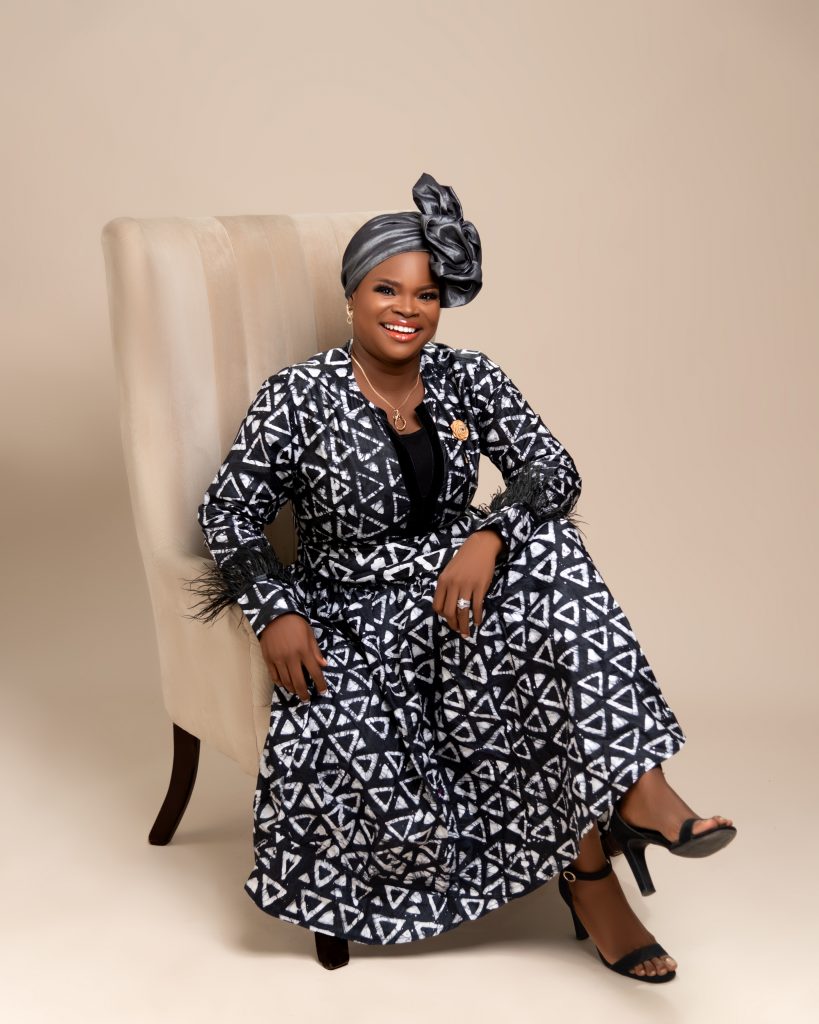
So this is the short-term plan. If you think a bit further ahead, say maybe in 5 or even 10 years, where do you hope to be?
The long term plan for us is to also expand the product line. Currently we’re mainly trying to solve problems that are caused by other products. For example, you come to us because your baby has a diaper rash, most likely caused by diapers or baby wipes. We don’t have the solution to prevent it, we only have the solution to solve it. So we want to create a situation where we have products for the entire lifecycle, from diapers, baby wipes to everything to do with hair and hygiene. Bottles, bottle utensils, cleaner – not just the detergents we currently have. And then also expand into other African countries and the West. Because Nigerians and Africans are everywhere in the world.
You’re one of the four female entrepreneurs on this delegation. Any word of advice for the next generation of women entrepreneurs, still wondering whether they can do it, should do it?
The possibilities are endless! Just now in Nigeria a young lady, just 27, broke the Guinness World Book record for the longest cooking time. She cooked for five days, no sleep, no rest, for 100 hours – because she wanted to prove a point. One of the reasons my dad left was because my mother kept having girl female children. He hasn’t met any of my children, he doesn’t see value in a female African child. So if you’re a female yourself and you’re sitting back, you’re constantly closing the doors on the other women who don’t even know this.
If you’re a female yourself and you’re sitting back, you’re closing the doors on other women
Maryam Adebola-Salami
When I heard I was the only female entrepreneur in the first DealRoom, I felt sad. Orange Corners Nigeria has graduated over 100 entrepreneurs, I can’t be the only female. It’s not possible, reach out to more people! With the Ghanaian women, it’s 30%, but it’s still not enough. You also see this in the political setting. When women aren’t given equal opportunities and you miss out on the empathetic gender, it’s difficult to have a stable society. So I would say to the next generation, or anyone who’s my generation: it’s never too late. I’ll keep going even at 55. So go get it. Just do it!
Follow Mariam’s Mobaby online:
Website
Facebook
Twitter
Instagram
YouTube

